Turning Food Waste into Soil, Roanoke Compost Company Aims To Fill a Curbside Void
Star City Compost takes food waste from Roanoke residents and businesses and converts it into clean compost that will soon be available for sale.
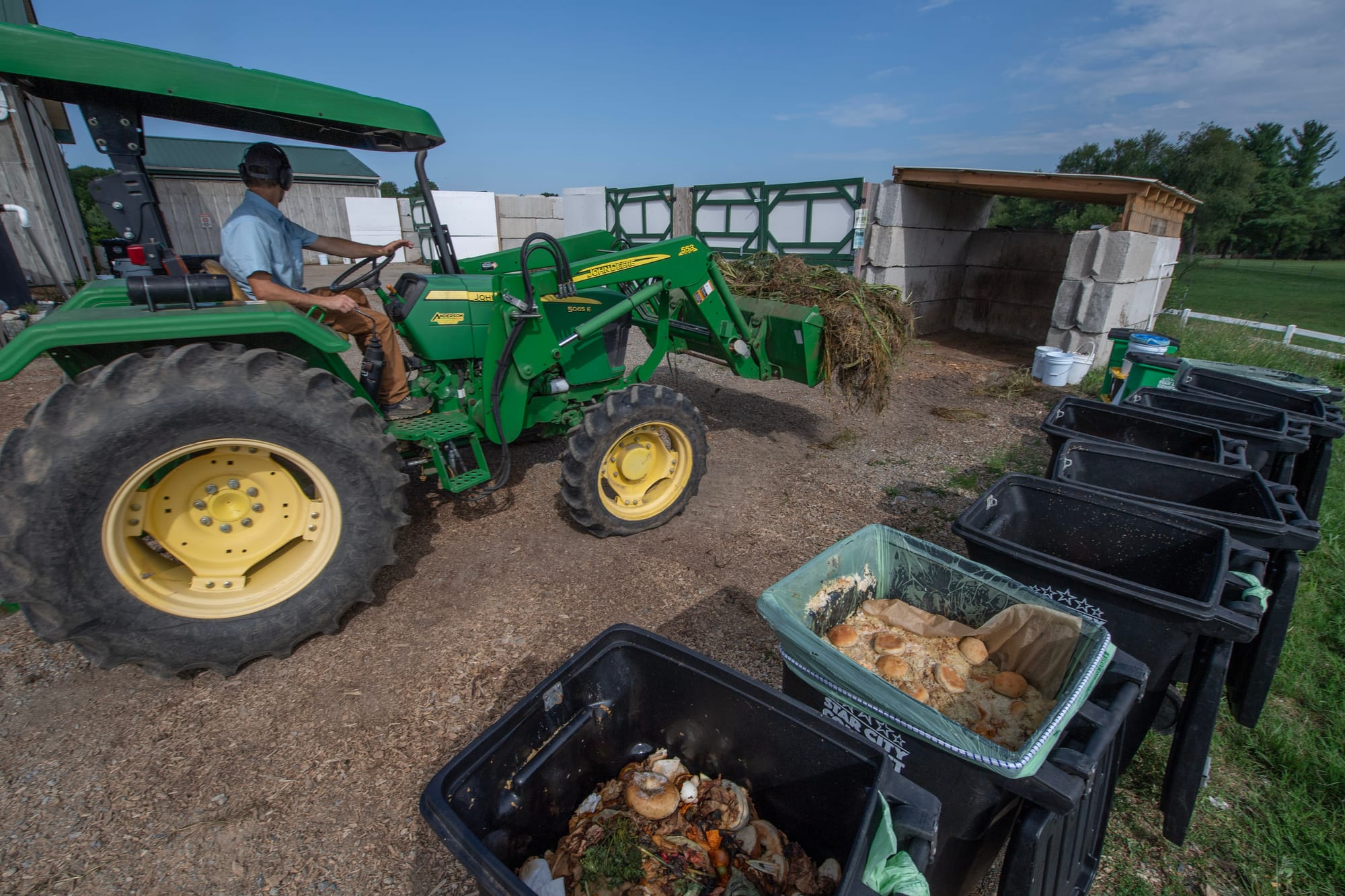
Working in compost stinks.
“It takes a special kind of person to do this,” said Davey Stewards as he flipped over a green, 32-gallon garbage bin and emptied its disgusting contents onto a concrete floor.
A smelly mess of goo that used to be on somebody’s dinner table oozed across the floor. A person could still recognize the rotten remains of oranges, corn cobs, banana peels and other former foods swimming in a gross soup.
“This is the ‘ick factor,’” said Craig Coker, Stewards’ business partner, who stood nearby, but not too close. “I have no sense of smell anymore.”
Stewards and Coker are a couple of investors and employees at Star City Compost, a recycling company that opened in January in the Roanoke Centre for Industry & Technology just off Orange Avenue. Star City Compost takes food waste from Roanoke residents and businesses and converts it into clean compost that will soon be available for sale. With a tractor, a barn, piles of wood chips and five large composting bunkers that turn food waste into nutritious soil addition that can grow living things, the company is sort of an industrial-sized version of a gardener’s backyard composting set-up.
Part of the company’s mission is to keep decaying food out of landfills, where it breaks down into methane, a greenhouse gas that’s a contributor to climate change.
About 25 percent of the quarter-million tons of garbage collected each year by the Roanoke Valley Resource Authority is made up of food waste, said Coker, who has been a recycling consultant for state and local governments and has nearly five decades of experience in the composting industry. He’d like to see more of that waste turned into compost, the decomposed organic matter that can add nutrients to soil.
Star City Compost picks up food waste each week from residential customers in the city of Roanoke, Salem and parts of Roanoke County who pay a $25 monthly fee and collect food in five-gallon white buckets provided by the company. Customers can also drop off their scraps at the company’s facility or other locations for $10 a month. Commercial clients pay $15 to $20 weekly for each 32-gallon or 64-gallon container.
Coker said the company currently serves about 160 residential clients, 45 of those curbside pickups, and four commercial operations, which include Hollins University’s dining facilities.
Previously, Hollins’ Moody Dining Hall had worked with another composting company, but it shut down, said Danny Accomando, the university’s director of dining services. Hollins began a “weigh the waste” program to determine how much leftover food was being thrown away by students. One day per week, leftovers were collected in a large container and weighed.
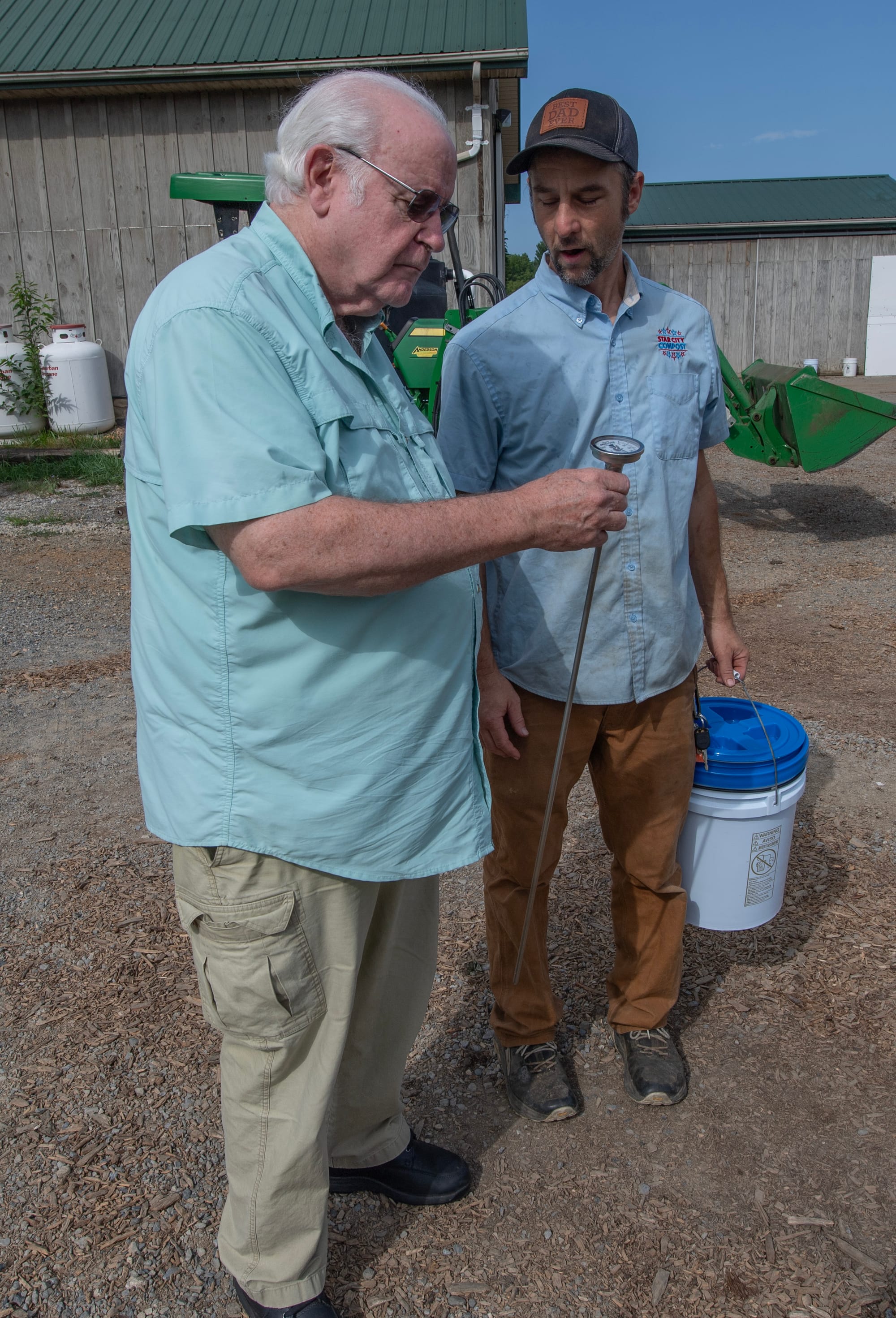
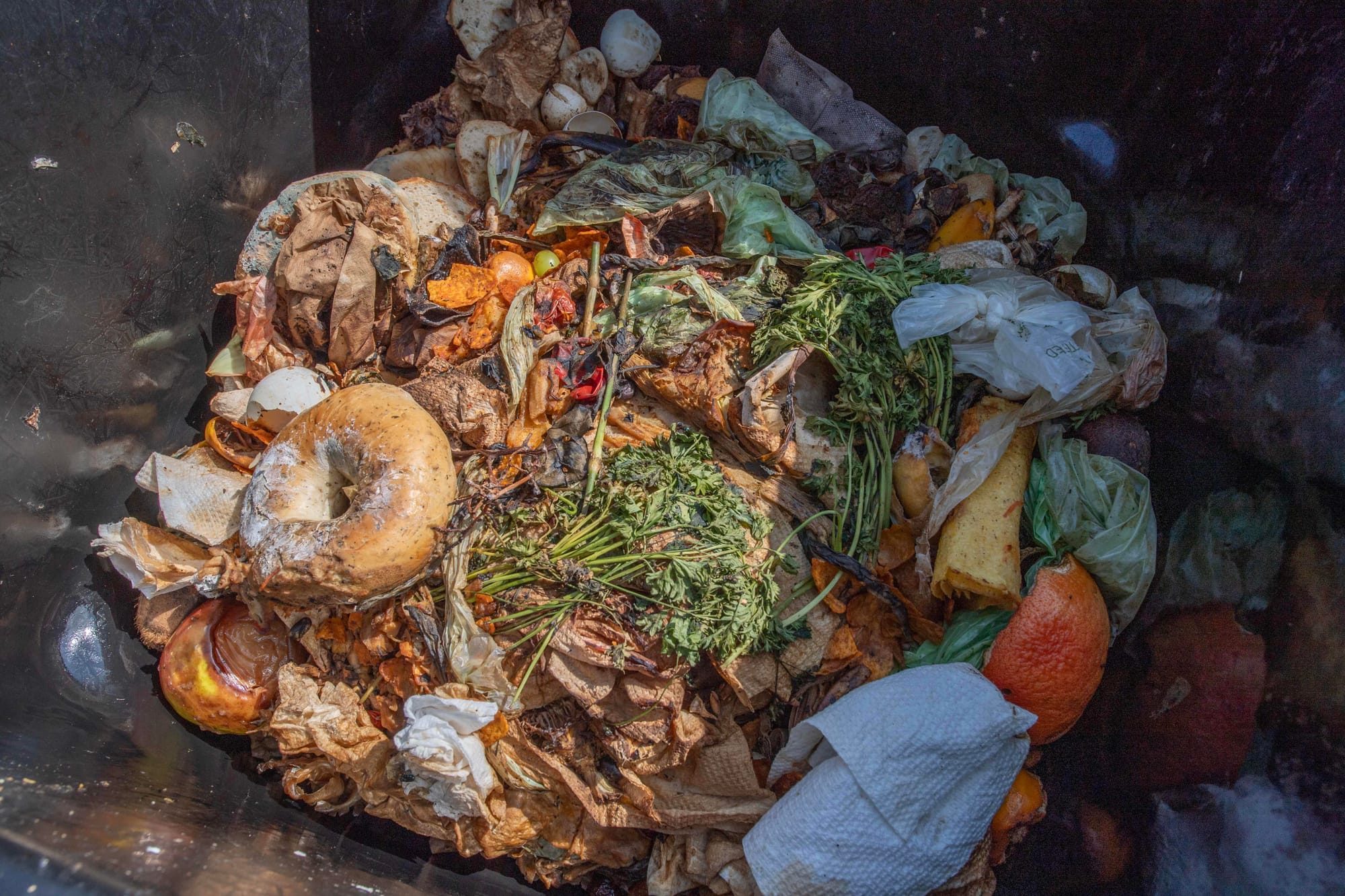
Star City Compost co-owners Craig Coker, left, and Davey Stewards, right, examine a thermometer used during the composting process. Above right, restaurant waste used in a compost mixture at the company's facility at the Roanoke Centre for Industry & Technology. PHOTOS BY DON PETERSEN FOR THE ROANOKE RAMBLER
“Once we had an idea about how much food was going to waste daily, we realized the only logical thing to do was to seek out another composting company,” Accomando said. He contacted Star City Compost even before it was open.
“Since the transition, we noticed we have cut back drastically on trash disposal and pick-up,” he said, adding that during the busiest times during fall and spring semesters, the university sends about 390 gallons of food a week to be composted.
“We have had a great experience with Star City and look forward to a long relationship,” Accomando said.
According to documents filed with the Department of Environmental Quality for permitting purposes, Star City Compost can handle 1,700 tons of waste, plus wood chips used in the process for breaking down the scraps, to make a couple thousand cubic yards of compost annually. The company hasn’t reached that maximum capacity, yet, but it hopes to have its first batch of compost available to sell to customers later this fall.
Coker, Stewards and three other individuals invested about $80,000 to start the business, which already turned a profit in the second quarter of this year — although neither Coker nor Stewards, the two primary employees, are taking a salary.
“Right now, it’s just ‘sweat equity,’” said Coker.
The two men make for what Coker calls the “yin and yang” of the business. Coker is a 70-year-old veteran of the industry, a guy who earned a sanitary engineering degree in the 1970s and has worked as a consultant to governments and industries ever since. He started a composting business near Asheville, North Carolina, in 1999 and now consults for Royal Oak Farms, a large organic waste recycling company in Bedford County. He and his wife, Doloris Vest, co-own the independent bookstore Book No Further on Roanoke’s City Market.
Stewards, 39, studied Environmental Science and Policy at the University of Maryland and has specialized in ecological education and other agricultural and environmental work. While living in Maryland, he collected scraps from restaurants that were turned into compost by a nonprofit group. After moving to Roanoke, where he lives with his wife and two young children, he operated the mobile market for Roanoke’s Local Environmental Agriculture Project (LEAP), which delivered fresh food to many low-income neighborhoods. He wanted to open a large-scale composting facility, as an effort to combat the effects of climate change, but lacked the resources until meeting Coker in 2018. Stewards said that Coker’s “ears perked up when he found out I was an exterior house painter,” Stewards said.
“I needed my house painted,” Coker admitted.
In short, Coker is the business guy, Stewards the hard-working, shoot-for-the-moon guy.
“Craig is a pioneer in this,” Stewards said. “He really gets it. He understands the importance of composting in our culture. He saw that I was somebody who would follow through on this.”
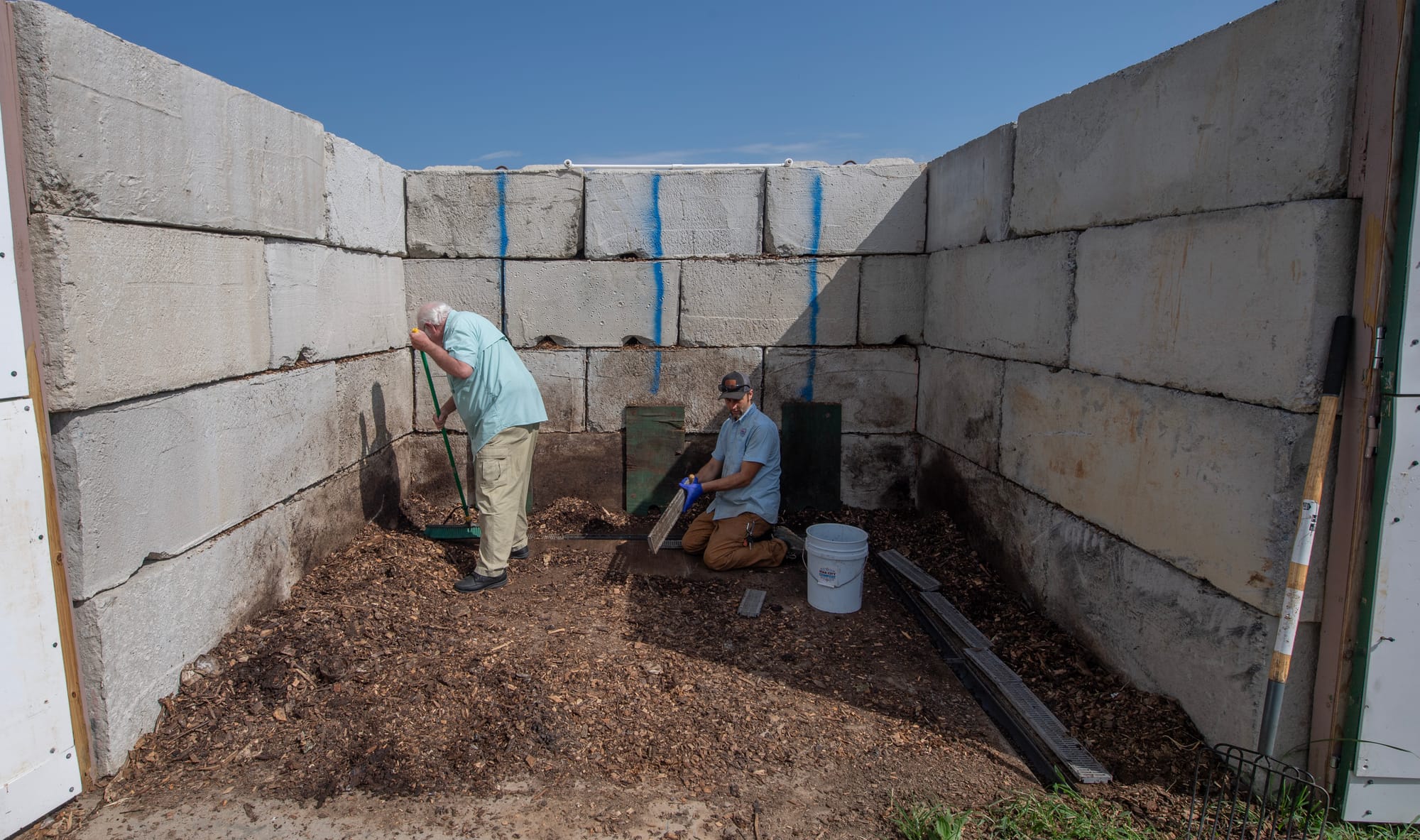
The company rents property owned by the Roanoke Natural Foods Co-op, which operated a farm along the sloping hillsides next to Blue Hills Golf Club. Star City Compost’s operation occupies about 1.5 acres of the Co-op’s 12-acre site. A barn that once housed horses used in Roanoke’s now-defunct police mounted patrol acts as office and meeting space. On a hill beyond a row of Osage orange trees, just below a ridge where the new Amazon distribution center rises, a garden grows that was planted by the Harvest Collective, a worker-owned farming and ecological cooperative that Stewards is part of and which is a Star City Compost investor.
Five side-by-side, concrete-block bays serve as composting stations. During the process, Stewards uses a John Deere tractor’s front-end loader to dump a layer of wood chips which he spreads with a pitchfork. When food waste is mixed in, the mulch-like wood chips help aerate the garbage. A series of PVC pipes connected to a motorized blower send air into the bins, which provides necessary oxygen for the bacteria, the single-celled microscopic organisms that break down the waste into soil.
“The microbes are living things that need air, oxygen, food and water,” Coker said. “In a gram of compost, there are one trillion microbes.”
The food and wood are mixed for 30 to 45 days, until the concoction maintains a consistent temperature of 131 degrees, which helps good microbes break down the food and kills off any disease-causing bacteria. The product is removed from the mixing bays by tractor and piled for the curing process, when fungi and other organisms finish the job of turning the waste into compost.
“It’s like wine aging in a bottle,” Coker said.
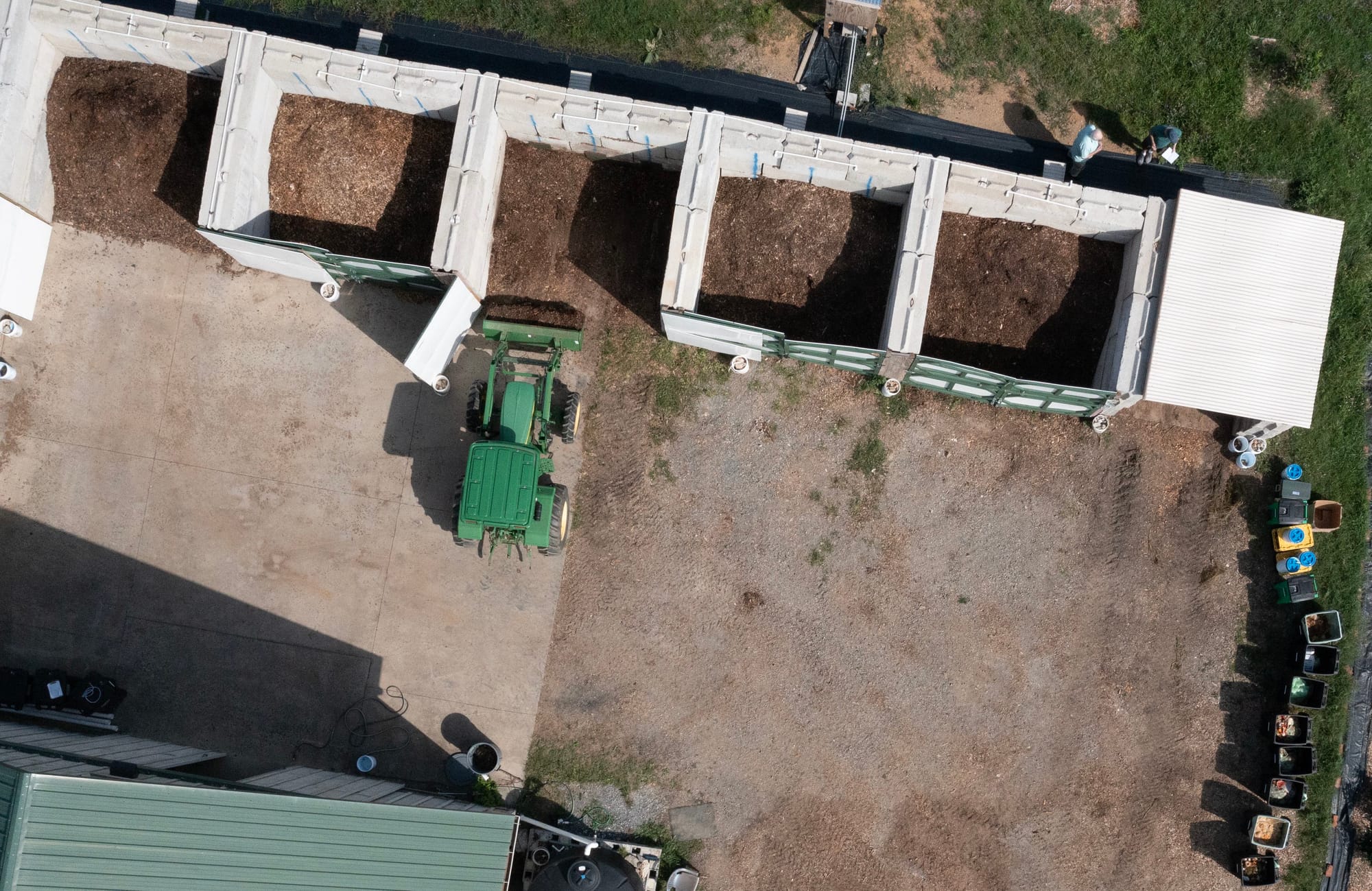
Star City Compost catches rainwater to keep the compost moist while the microbes do their work, and the company planted a garden of native plants downhill from the facility to absorb any runoff.
The work is hot, dirty and smelly, especially during a record-breaking summer in Roanoke, which generated a fortune of the “sweat equity” Coker talked about.
Stewards handles the pickups, including gathering the large commercial bins in a former RADAR medical transportation bus that was donated to the company. The vehicle’s wheelchair lift allows Stewards to roll the bins right onto the bus.
Back at the facility, Stewards dumped the food scraps into the mixing areas. Wearing blue plastic gloves, he removed non-food and non-biodegradable contaminants by hand — stuff like plastic forks and knives or other items that won’t break down. He even has to dump food from biodegradable trash bags in order to speed up the decaying process.
“The actual compost doesn’t smell bad,” Stewards said. “This smells bad.”
When the company has compost to sell, the current customers will get first dibs on the soil at a discounted price. Coker said that Star City Compost might consider bagging its product to sell at retail shops.
As more customers sign on, the company expects to extend its coverage area for curbside pickups, Coker and Stewards both said. Star City Compost accepts food waste, coffee grounds and even newspapers and pizza boxes. (A list of accepted products can be found online at this link.)
Richmond, Falls Church and a few other Virginia municipalities have added community composting programs in recent years, in which residents can drop off compost at designated sites. Richmond received a $90,000 grant from the United States Department of Agriculture to start its pilot program in 2022. Roanoke’s Sustainability and Climate Resiliency plan encourages residents to increase home composting and calls for local drop-off sites for food waste.
Even though the operation is small compared to the enormity of the food waste generated, both men believe the company is doing its part in reducing greenhouse gasses, keeping waste out of landfills and turning garbage into life-giving compost. They expect the company to grow like a garden planted in rich soil.
“I love having this platform to talk about these things,” Stewards said. “Composting is a simple way to save the earth’s resources that’s often overlooked.”

